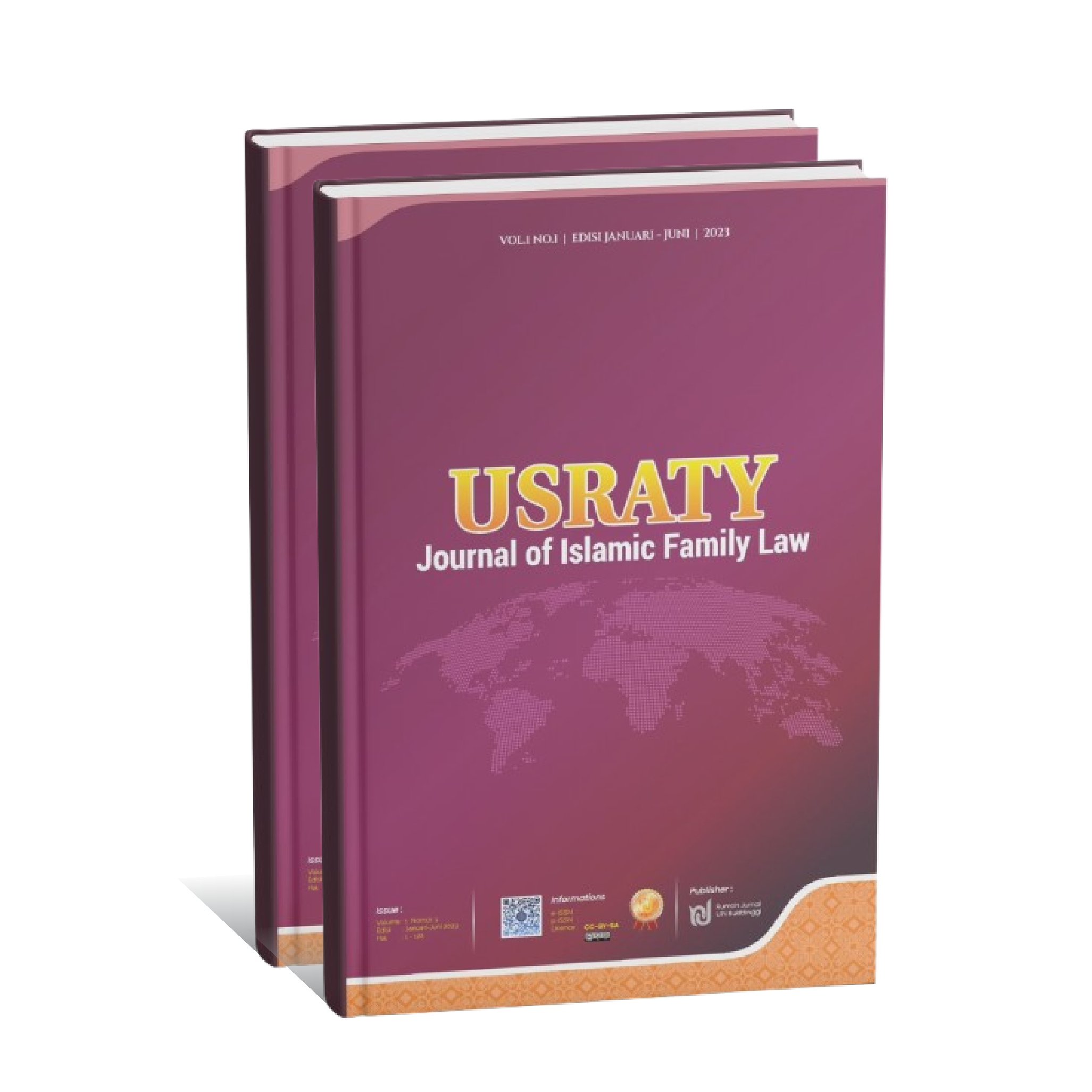Legal Dynamics of Financial Responsibility and Marital Property in Marriage in Indonesia
DOI:
https://doi.org/10.30983/usraty.v3i1.8948Keywords:
Financial Responsibility, Gender Equity, Marriage Law, Marital Property, Spousal RightsAbstract
This study explores the legal dynamics between financial responsibility and marital property in the context of marriage in Indonesia, with a specific focus on reconciling the normative gap between Islamic law and Indonesia’s national legal system. While Islamic law places full financial responsibility (nafaqah) on the husband, Indonesian civil law applies a gender-neutral approach by recognizing joint marital property acquired during marriage, regardless of who earned it. This normative legal research employs a qualitative approach using statutory, conceptual, and comparative analyses of both Islamic legal texts (Qur’an, Hadith, and classical fiqh) and national legal instruments such as the Marriage Law No. 1 of 1974 and the Compilation of Islamic Law (KHI). The findings reveal a fundamental inconsistency: Islamic jurisprudence emphasizes the husband's economic duty, whereas civil law presumes equal ownership, potentially leading to legal ambiguity in divorce and inheritance cases. The study concludes that this dualism requires a contextual reinterpretation of the joint property regime that respects Islamic ethical values while adapting to modern socio-economic realities, including the increasing financial contributions of women. It is recommended that legal reforms recognize differentiated spousal roles without undermining gender justice. This research contributes academically by proposing an integrative legal framework that bridges the gap between normative Islamic obligations and the state’s egalitarian legal principles. Such a framework offers a more just, ethical, and socially relevant model for regulating financial responsibility and property rights in Muslim marriages within Indonesia’s plural legal system.
References
Antonelli, J., Papadogeorgou, G., & Dominici, F. (2022). Causal inference in high dimensions: A marriage between Bayesian modeling and good frequentist properties. Biometrics, 78(1), 100–114. https://doi.org/10.1111/biom.13417
Arifin H. Munir, Z., Nurul Wathoni, L. M., Bin Mujib, L. S., & Dahri, H. (2022). Tahlil Marriage Among the Sasak Tribe of Lombok Based on Maqashid Al-Shari’ah Perspective and Its Relevance to Compilation of Islamic Law. Al-’Adalah, 19(2), 419–440. https://doi.org/10.24042/adalah.v19i2.14495
Attah, M. (2018). Divorcing Marriage from Marital Assets: Why Equity and Women Fail in Property Readjustment Actions in Nigeria. Journal of African Law, 62(3), 427–446. https://doi.org/10.1017/S0021855318000207
Awiety, J., & Riyadi, A. K. (2020). History of Joint Marital Property in Indonesia and its Legalization. Malaysian Journal of Syariah and Law, 8(2), 94–112. https://doi.org/10.33102/mjsl.vol8no2.256
Bilalu, N., Jamal, R., Harun, N., & Subeitan, S. M. (2022). Compilation of Islamic Law as Judge’s Consideration at a Religious Court in North Sulawesi, Indonesia. Samarah: Jurnal Hukum Keluarga Dan Hukum Islam, 6(2), 514. https://doi.org/10.22373/sjhk.v6i2.12441
Casari, M., Lisciandra, M., & Tagliapietra, C. (2019). Property Rights, Marriage, and Fertility in the Italian Alps, 1790–1820. Explorations in Economic History, 71, 72–92. https://doi.org/10.1016/j.eeh.2018.09.001
Chen, H.-H., Lai, J. C.-Y., & Chien, L.-Y. (2021). The psychometric properties of the Bidimensional Acculturation Scale for Marriage-Based Immigrant Women in Taiwan. PLOS ONE, 16(10), e0258323. https://doi.org/10.1371/journal.pone.0258323
Choi, S. Y. P., & Cheung, A. K.-L. (2017). Dissimilar and Disadvantaged: Age Discrepancy, Financial Stress, and Marital Conflict in Cross-Border Marriages. Journal of Family Issues, 38(18), 2521–2544. https://doi.org/10.1177/0192513X16653436
Çineli, B., & Mugiyama, R. (2023). Money management over the course of marriage: Parenthood, employment and household financial organization in Japan. Advances in Life Course Research, 56, 100544. https://doi.org/10.1016/j.alcr.2023.100544
Dew, J. P., Anderson, B. L., Skogrand, L., & Chaney, C. (2017). Financial Issues in Strong African American Marriages: A Strengths‐Based Qualitative Approach. Family Relations, 66(2), 287–301. https://doi.org/10.1111/fare.12248
Fam, J. Y., Yaacob, S. N., Juhari, R., Arshat, Z., & Mukhtar, F. (2017). General Attitudes Towards Marriage Scale: Psychometric Properties in Malaysian Adolescents of Divorced Families. Journal of Child and Family Studies, 26(12), 3351–3359. https://doi.org/10.1007/s10826-017-0849-7
Frutos, A. M., & Merrill, R. M. (2017). Explicit Sexual Movie Viewing in the United States According to Selected Marriage and Lifestyle, Work and Financial, Religion and Political Factors. Sexuality & Culture, 21(4), 1062–1082. https://doi.org/10.1007/s12119-017-9438-6
Gatti, F., & Strobl, E. (2025). Marriage, Financial Constraints, and Morality in Late 19th and Early 20th Century Colonial Jamaica. The History of the Family, 1–33. https://doi.org/10.1080/1081602X.2025.2512597
Husni, S., Syahriani, F., Husni, A., Wahid, A., & Ngardi, V. (2024). Determination of Nasab of Children Outside of Marriage in the Islamic Legal System: The Role and Decisions of Religious Courts in Indonesia. Hakamain: Journal of Sharia and Law Studies, 3(1), 26–36. https://doi.org/10.57255/hakamain.v3i1.332
Khan, S. (2024). Female education and marriage in Pakistan: The role of financial shocks and marital customs. World Development, 173, 106413. https://doi.org/10.1016/j.worlddev.2023.106413
Kim, P.-S., & Lee, Y.-S. (2021). Parental Financial Support and the Transition to Marriage for Young Adults in South Korea. Journal of Comparative Family Studies, 52(1), 47–66. https://doi.org/10.3138/jcfs.52.1.005
Lee, Y. G., & Dustin, L. (2021). Explaining Financial Satisfaction in Marriage: The Role of Financial Stress, Financial Knowledge, and Financial Behavior. Marriage & Family Review, 57(5), 397–421. https://doi.org/10.1080/01494929.2020.1865229
Lersch, P. M. (2017). Individual Wealth and Subjective Financial Well‐being in Marriage: Resource Integration or Separation? Journal of Marriage and Family, 79(5), 1211–1223. https://doi.org/10.1111/jomf.12406
Marlina, S., & Mubarak, H. (2022). Joint Property after Divorce in the Polygamous Marriage: Comparative Research in Indonesia and Malaysia. Al-Risalah: Forum Kajian Hukum Dan Sosial Kemasyarakatan, 22(2), 273–287. https://doi.org/10.30631/alrisalah.v22i2.1289
Musarrofa, I., Muttaqin, H., & Amaliyah, R. (2024). The Problems of Islamic Family Law in the Digital Era and Its Relevance to Renewal of the Compilation of Islamic Law. Jurnal Hukum Islam, 22(1), 89–124. https://doi.org/10.28918/jhi_v22i1_4
Nasution, K. (2005). Women’s Right in the Islamic Family Law of Indonesia. Unisia, 28(56), 192–204. https://doi.org/10.20885/unisia.vol28.iss56.art10
Nugroho, E. R., Prabowo, B. A., & Rohidin, R. (2024). Granting of Property During Marriage as an Inherited Property in Indonesia. El-Usrah: Jurnal Hukum Keluarga, 7(1), 310. https://doi.org/10.22373/ujhk.v7i1.22875
Nurhayati, S. R., Setiawati, F. A., Amelia, R. N., & Fridani, L. (2023). Psychometric properties of dyadic data from the Marital Quality Scale of Indonesian Javanese couples. Psicologia: Reflexão e Crítica, 36(1), 36. https://doi.org/10.1186/s41155-023-00279-7
Nurmila, N. (2016). Polygamous Marriages in Indonesia and Their Impacts on Women’s Access to Income and Property. Al-Jami’ah: Journal of Islamic Studies, 54(2), 427. https://doi.org/10.14421/ajis.2016.542.427-446
Nurunnisa, N., Erliyani, R., Hermawan, G. F., & Abdelhadi, Y. M. M. (2023). Implications of Annulment of Marriage on the Distribution of Joint Assets according to the Compilation of Islamic Law and National Law. Syariah: Jurnal Hukum Dan Pemikiran, 23(1), 1–23. https://doi.org/10.18592/sjhp.v23i1.9523
Nutz, T., Nelles, A., & Lersch, P. M. (2022). Who Opts Out? The Customisation of Marriage in the German Matrimonial Property Regime. European Journal of Population, 38(3), 353–375. https://doi.org/10.1007/s10680-022-09613-8
Ojogbo, S. E., & Edu, O. K. (2022). Comparing maintenance and property rights in marriage under customary law and statutory law in Africa. Oxford University Commonwealth Law Journal, 22(2), 229–252. https://doi.org/10.1080/14729342.2022.2153508
Pelu, I. E. A., & Dakhoir, A. (2021). Marital Property within the Marriage Law: A Debate on Legal Position and Actual Applications. Al-Jami’ah: Journal of Islamic Studies, 59(2), 287–316. https://doi.org/10.14421/ajis.2021.592.287-316
Ross, D. B., O’Neal, C. W., Arnold, A. L., & Mancini, J. A. (2017). Money Matters in Marriage: Financial Concerns, Warmth, and Hostility Among Military Couples. Journal of Family and Economic Issues, 38(4), 572–581. https://doi.org/10.1007/s10834-017-9522-y
Saiin, A., Kholidah, K., Zulfahmi, Z., M. Radiamoda, A., & Gemilang, K. M. (2023). The Property Rights Regulation, Semenda Marriage, and Exploring the Determinants in ASEAN Countries. Journal of Human Rights, Culture and Legal System, 3(2), 134–159. https://doi.org/10.53955/jhcls.v3i2.68
Solikin, N., & Wasik, M. (2023). The Construction of Family Law in the Compilation of Islamic Law in Indonesia: A Review of John Rawls’s Concept of Justice and Jasser Auda’s Maqashid al-Shari’a. Ulumuna, 27(1), 315–340. https://doi.org/10.20414/ujis.v27i1.708
Sorgente, A., Lanz, M., Tagliabue, S., Wilmarth, M. J., Archuleta, K. L., Yorgason, J., & James, S. (2023). Yours, mine, or ours: Does bank account status in early marriage affect financial behavior and financial satisfaction? Journal of Social and Personal Relationships, 40(12), 4023–4049. https://doi.org/10.1177/02654075231201554
Sugianto, F., & Suhartono, S. (2018). The Existence of President Instruction of The Republic of Indonesia Number 1 The Year 1991 on The Wide Spread of Compilation of Islamic Law in Indonesian Legal System. AL-IHKAM: Jurnal Hukum & Pranata Sosial, 13(2), 291–309. https://doi.org/10.19105/al-lhkam.v13i2.1727
Sweeny, R. C. H. (2021). Going Together Like a Horse and Carriage: Rentier Marriages and Property Accumulation in Montréal, 1825–1903. Histoire Sociale / Social History, 54(112), 481–490. https://doi.org/10.1353/his.2021.0049
Widiani, A. K. H. D. (2022). Socio-Juridical Analysis on Polygamy Requirements in the Compilation of Islamic Law (KHI). Al-’Adalah, 19(1), 195–222. https://doi.org/10.24042/adalah.v19i1.10266
ZAVORETTI, R. (2016). Is it Better to Cry in a BMW or to Laugh on a Bicycle? Marriage, ‘financial performance anxiety’, and the production of class in Nanjing (People’s Republic of China). Modern Asian Studies, 50(4), 1190–1219. https://doi.org/10.1017/S0026749X15000220
Zimmermann, T., de Zwaan, M., & Heinrichs, N. (2019). The German version of the Quality of Marriage Index: Psychometric properties in a representative sample and population-based norms. PLOS ONE, 14(2), e0212758. https://doi.org/10.1371/journal.pone.0212758
Downloads
Published
How to Cite
Issue
Section
Citation Check
License
Copyright (c) 2025 Rahmi, Jayusman, Nur Azizah, Efrinaldi, Rahmawati

This work is licensed under a Creative Commons Attribution-ShareAlike 4.0 International License.



